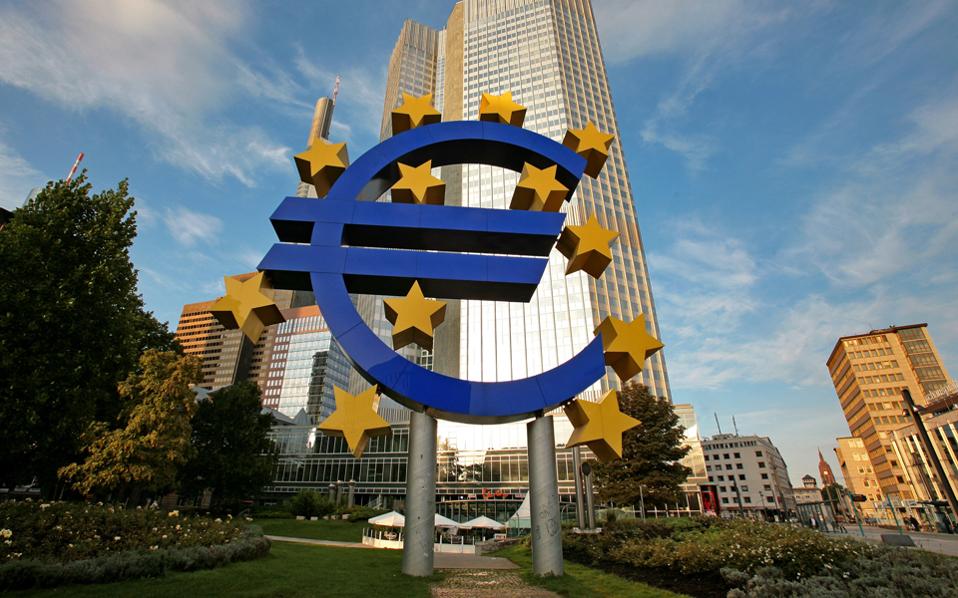Η ΕυρωπαΪκή Κεντρική Τράπεζα (ΕΚΤ) είναι απίθανο να μειώσει την αξία των ελληνικών ενεχύρων αυτή την εβδομάδα και αναμένεται να αυξήσει πάλι το όριο χρηματοδότησης των ελληνικών τραπεζών μέσω του ELA, αναφέρει δημοσίευμα του Reuters που επικαλείται πηγές που γνωρίζουν τον τρόπο σκέψης της κεντρικής τράπεζας.
“Υπάρχουν περισσότερα θετικά μηνύματα από την ελληνική κυβέρνηση”, δήλωσε μία πηγή, προσθέτοντας: “Μπορών να φανταστώ ότι το παιχνίδι, όπου αυξάνουμε σταθερά το όριο του ELA κατά ένα μικρό ποσό, δεν θα σταματήσει στη συνεδρίαση (της ΕΚΤ) αυτή την εβδομάδα”.
“Υπάρχει περισσότερη ικανότητα, περισσότερη θέληση για συμβιβασμό και περισσότερη ετοιμότητα – δεχομένα, στοιχεία κλ.π.”, δήλωσε αξιωματούχος της ΕΕ που έχει γνώση των συζητήσεων. Αλλά, πρόσθεσε, το να πούμε ότι θα υπάρξει συμφωνία στις 11 Μαίου, θα ήταν μία “εικασία”.
Ο αντιπρόεδρος της ΕΚΤ Βίτορ Κονστάντσιο δήλωσε ότι είναι πεπεισμένος πως η Αθήνα και οι πιστωτές της θα καταλήξουν σε συμφωνία και θα αποφευχθεί μία χρεοκοπία ή έξοδος της Ελλάδας από το ευρώ. “Είμαι… απόλυτα πεπεισμένος ότι θα αποφευχθεί το χειρότερο σενάριο”, δήλωσε ο κεντρικός τραπεζίτης σε συνέντευξη που έδωσε σε ολλανδική εφημερίδα.
Η ΕΚΤ αύξανε το τελευταίο τρίμηνο κάθε εβδομάδα το όριο χρηματοδότησης των ελληνικών τραπεζών μέσω του ELA, ώστε να καλύψει την επίπτωση στη ρευστότητά τους από την εκροή καταθέσεων.
Σε μία προσπάθεια να πιέσει περαιτέρω την Αθήνα να κινηθεί προς μία συμφωνία με τους δανειστές της, ο Πρόεδρος της ΕΚΤ Μάριο Ντράγκι ανακοίνωσε την περασμένη εβδομάδα ότι το Διοικητικό Συμβούλιο της θα εξέταζε την απομείωση της αξίας των ενεχύρων (ομολόγων του ελληνικού δημοσίου ή ομολόγων με την εγγύηση του ελληνικού δημοσίου), εφόσον δεν είναι ορατή μία συμφωνία.
Σύμφωνα με δημοσίευμα, τα σενάρια που θα εξετάσει η ΕΚΤ αφορούν τη μείωση των ενεχύρων κατά 44%, 65% ή ακόμη και 80% αντί του 23% που ισχύει σήμερα, τα οποία σημαίνουν ότι – ανάλογα με το ποσοστό μείωσης – θα εξαντλούνται ταχύτερα τα ενέχυρα που θα μπορούσαν να δώσουν οι ελληνικές τράπεζες για να λάβουν ρευστότητα από την ΕΚΤ.
Πηγή: Reuters
Wide differences over pension and labor reforms continued to dog intensive negotiations between Greece’s leftist government and its international creditors despite progress in other areas as the country’s cash position becomes increasingly critical.
Government spokesman Gabriel Sakellaridis sounded the alarm on Monday, saying that while Athens intended to meet all its payment obligations, including nearly 1 billion euros to the IMF in May, it needed fresh funds before the end of the month.
“Liquidity is a pressing issue,” Sakellaridis told a news conference. “The Greek government is not waiting until the end of May for a liquidity injection. It expects this liquidity to be offered to the Greek economy as soon as possible.”
Labor Minister Panos Skourletis said the International Monetary Fund, Greece’s second biggest creditor after euro zone governments, was insisting on tough policy conditions for an interim deal to unlock frozen bailout aid.
The global lender was unyielding in demands for pensions cuts, rules to ease mass layoffs of private sector workers and opposition to a government plan to raise the minimum wage, Skourletis told Mega TV.
“They are asking us to not touch anything (of the austerity measures) that have ruined Greek people’s lives in the last five years,” he said.
“The IMF is the most inflexible side … the most extreme voices of the Brussels Group,” the minister said. “But there are also calmer voices.”
Greece faces repayments to the IMF totaling 970 million euros by May 12. It has been borrowing from municipalities and government entities to meet obligations.
Intensive talks on an interim deal between a reshuffled Greek negotiating team and representatives of the European Commission, the European Central Bank and the IMF, renamed the “Brussels Group”, have been under way since last Thursday.
A European Commission spokesman said the negotiators worked through the weekend. Talks were “constructive” but work remains, he said, declining to give details.
The aim is to achieve a technical-level accord that would enable euro zone finance ministers to declare when they meet on May 11 that there is a prospect of concluding the bailout review successfully. That could give the ECB grounds to permit Greek banks to buy more short-term treasury bills, easing the government’s cash crunch.
“RED LINES”
On Sunday, Greek and euro zone officials reported progress on some issues and forecast a result by Wednesday, when the ECB holds its weekly review of emergency lending to Greek banks.
A euro zone official said there was more convergence on some areas than others. Skourletis made clear that social policies which Prime Minister Alexis Tsipras’ radical Syriza party has declared “red lines” were the main stumbling block.
“Everyone acknowledges that the degree of stress and vulnerability in the euro area has totally changed. There are no signs of contagion,” he added, suggesting the ECB’s bond buying program had eased concerns that Greece’s problems might spread to other euro zone economies.


